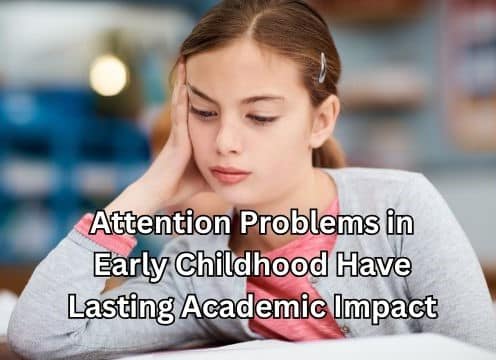
Children with attention problems in early childhood were 40 percent less likely to graduate from high school, says a study from Duke University that examined how early childhood characteristics affect academic performance.
Study on long-term effect of attention problems
“There’s not a lot out there about how early attention problems affect academic outcomes over such a long time frame,” said David Rabiner, an associate dean of Duke’s Trinity College of Arts & Sciences and a faculty fellow of the Duke Center for Child and Family Policy. “This study is one of the first to focus on how attention problems as early as first grade relate to such an important educational outcome as high school graduation.”
The study, published in School Psychology Review, included 386 kindergarteners from schools in the Fast Track Project, a multi-site clinical trial in the USA that began tracking how children developed across their lives in 1991.
This study examined early academic, attention, and socio-emotional skills and how each contributed to academic success into young adulthood.
Early attention skills predict academic success
They found early attention skills were the most consistent predictor of academic success, but that likability also had a modest effect on academic performance.
By fifth grade (Grade 5), children with early attention difficulties had lower grades and reading achievement scores than their peers. As fifth-graders, children with early attention problems experienced average reading scores at least 3 percent lower than their contemporaries’ and grades at least 8 percent lower than those of their peers. This was after controlling for IQ, socioeconomic status and academic skills at school entry.
Although these may not seem like large effects, the impact of early attention problems continued to reverberate throughout the children’s academic careers. Lower reading achievement scores and grades in fifth grade contributed to reduced grades in middle school, thereby contributing to a 40 percent lower high school graduation rate.
“The children we identified as having attention difficulties were not diagnosed with ADHD, although some may have had the disorder. Our findings suggest that even more modest attention difficulties can increase the risk for negative academic outcomes,” said Rabiner, whose research has focused on attention deficit hyperactivity disorder, or ADHD, and interventions to improve academic performance in children with attention difficulties.
Likability had a modest effect
Social acceptance by peers in early childhood also predicted grades in fifth grade. Children not as liked by their first-grade peers had slightly lower grades in fifth grade, while those with higher social acceptance had higher grades.
Researchers said this is the first study to use children’s reports of their peers’ likability to examine whether peer relations can help predict academic outcomes when accounting for other factors such as early academic skills and attention problems.
“This study shows the importance of so-called ‘non-cognitive’ or soft skills in contributing to children’s positive peer relationships, which, in turn, contribute to their academic success,” said Kenneth A. Dodge, the director of the Duke Center for Child and Family Policy and a professor of public policy and neuroscience at the university.
The results highlight the need to develop effective early interventions to help those with attention problems stay on track academically, and for educators to encourage positive peer relationships, the researchers said.
“We are learning that student success requires a more comprehensive approach, one that incorporates not only academic skills but also social, self-regulatory, and attention skills,” Dodge said. “If we neglect any of these areas, the child’s development lags. If we attend to these areas, a child’s success may reinforce itself with positive feedback loops.”
